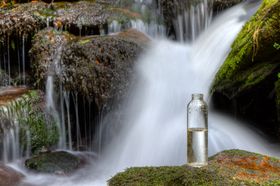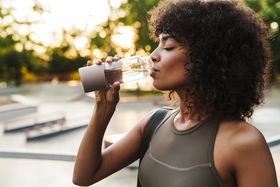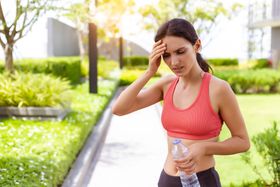Beat the Heat: How to Stay Hydrated in Hot Weather
Sweating more than you’re sipping? In scorching heat, your body drains a water bottle’s worth of fluid in just an hour. Don’t let the sun steal your summer. Here’s how to stay hydrated in hot weather.
Updated April 7, 2025

As the summer sun blazes and temperatures soar, water intake becomes more than just a comfort—it’s a matter of health and safety. Dehydration creeps in silently, leaving you dizzy, fatigued, and struggling to focus.
You might think you’re doing enough—gulping a glass of water here, sipping a sports drink there—but are you really hydrating effectively? Waiting until you’re parched to drink means you’re already dehydrated. Relying on sugary sodas or caffeine-loaded iced coffee? They can worsen fluid loss.
Don’t let the heat derail your plans—or your health. Below, we break down the science-backed strategies to keep you safely hydrated, no matter how high the sun climbs.
» Want to hydrate in hot weather? Infuse your water with electrolyte drops
Why Do We Need to Stay Hydrated in Hot Weather?
When you're exposed to heat, your core body temperature rises. To regulate this, your body activates sweat glands, increasing sweat production to help cool you down through evaporation.
As you lose fluids through sweat, you become thirsty—your body’s signal to rehydrate and maintain temperature balance.
In hot and humid environments, however, sweat doesn’t evaporate efficiently, which slows down heat loss. As a result, people in humid climates often feel thirstier and find drinking fluids more satisfying.
Humidity also causes more profuse sweating, meaning your body works even harder to stay cool. That’s why people in humid conditions typically need more fluids than those in dry, arid heat.
» Check out the best water types to drink if you're dehydrated
3 Best Ways to Stay Hydrated in Hot Weather (By Activity Level)
1. Moderate Outdoor Activity
Baseline Hydration: Aim for 2 liters (8-10 cups) of fluid daily.
During Activity: Replenish 4 ounces (120 ml) of fluid every 20 minutes.
You should aim for a mix of water and sports drinks to replace electrolytes lost through sweat.
Avoid sugary drinks; choose low-sugar electrolyte solutions or homemade drinks (e.g., water with lemon, salt, and honey).
2. Intense Exercise or Sports
Pre-Hydration:
Drink 2–2.5 cups (500–600 ml) of water or sports drink 2–3 hours before exercise.
Drink 1 additional cup (240 ml) 10–20 minutes before starting.
During Exercise:
Drink 1 cup (240 ml) every 10–20 minutes to limit body weight loss to <2% [1].
Prioritize cool beverages.
Post-Workout: Weigh yourself and drink 16–24 ounces (500–700 ml) per pound lost.
3. Casual Time Outdoors (No Exercise)
Hourly Intake: Drink 1 cup (240 ml) of water per hour while outside.
Daily Total: Aim for 2–3 liters (8–12 cups) daily, including hydrating foods like watermelon, cucumbers, tomatoes, strawberries, or lettuce.
Cooling Tricks:
Spray water on your skin or wear damp, light-colored clothing to lower core temperature.
Avoid alcohol (a diuretic) and opt for herbal teas or infused water instead.
» Find out how dehydration affects your brain
Cold vs. Hot Weather: How Much Water Should You Be Drinking?
You should drink more water during summer compared to cooler months, but not as much as you might think.
You should drink around one-half fluid ounce to one fluid ounce per pound of your body weight. For example, a person who weighs 200 pounds should drink around 12.5 to 25 cups of fluid in total. If you're performing intense work or exercising outdoors in the heat, aim for the higher end of that range.
On the other hand, it's still important to stay hydrated during cold weather. Health experts suggest you should still aim for 8-12 cups (2-3 liters) daily. Older adults, who experience muscle and body water loss, need to be diligent about drinking enough water, regardless of the weather.
If you're looking to boost your hydration further, you can add electrolyte drops to your water. MAYU Electrolyte Drops are especially useful in high-heat conditions because they help you retain fluids better.
Signs of Heat-Related Dehydration
Heat-related dehydration occurs when your fluid loss from sweating exceeds your intake, disrupting your electrolyte balance.
There are a couple of common dehydration symptoms like:
- Thirst
- Dry mouth
- Dark urine
But you can also show more subtle signs, such as:
1. Subtle Behavioral Changes
- Irritability (In Children): Infants and toddlers may become fussy or lethargic without obvious thirst cues.
- Cognitive Decline (In Seniors): Confusion or sluggishness in seniors, often mistaken for fatigue, can signal dehydration even without thirst.
- Exercise Intolerance: Sudden difficulty performing routine physical activities, which relates to a rare muscle breakdown injury (rhabdomyolysis) that results from electrolyte imbalances [2].
» Discover the best electrolytes for seniors to rehydrate
2. Skin and Urine Clues
- Tenting" Skin: Gently pinch the skin on the back of the hand. If it remains raised and is slow to snap back.
- Urine Specifics: Consistently small volumes of urine (oliguria) or tea-colored urine may signal severe dehydration or rhabdomyolysis [3].
3. Silent Progression
Older adults and people taking beta-blockers or diuretics may not feel thirsty until it becomes severe due to impaired thirst mechanisms [4].
» Learn to check for dehydration at home
How to Prevent Dehydration in the First Place
- Medication Awareness: Drugs like antihistamines, antipsychotics, and diuretics can impair sweating or increase fluid loss [5]. You should consult your doctor to adjust dosages or timing during heatwaves.
- Urban Heat Mitigation: The "heat island effect" in cities amplifies dehydration risk. You can use cooling centers, reflective window films, or misting fans to counteract trapped heat.
- Electrolyte Balance Beyond Sports Drinks: For prolonged physical strain, try rehydrating with electrolyte drops instead of sugary sports drinks, which may cause stomach issues.
- Acclimatization: Gradually increase exposure to heat over 7–14 days to boost sweat efficiency and plasma volume, reducing dehydration risk.
- Dietary Adjustments: Include water-rich foods like cucumbers, watermelon and avoid high-protein meals, which increase metabolic heat production.
- Pre-Hydration Protocols: Drink 17–20 oz of water 2–3 hours before activity, followed by 8 oz 20 minutes prior, to "prime" hydration levels. Weigh yourself before and after exercise; for every pound lost, drink 16–24 oz of fluid to replenish losses.
» Find out how to replenish your electrolytes after exercise
Critical Nuances for At-Risk Groups
- Diabetes and Kidney Disease: These conditions impair fluid retention. People with diabetes who want to stay hydrated should monitor blood glucose levels closely, as hyperglycemia worsens dehydration [6,7].
- Athletes in Humid Conditions: High humidity reduces sweat evaporation, leading to excessive fluid loss without effective cooling. Use wet towels or cooling vests to aid thermoregulation.
» Find out how to drink more water when it's a struggle
Working Long Hours Outside? Here's How to Prevent Dehydration
If you work outdoors in the scorching heat, there are several strategies you can try to prevent dehydration. Take a look at some of them below:
Drink plenty of water throughout the day, even if you don’t feel thirsty.
Avoid alcohol or sugary drinks to prevent further dehydration.
Limit caffeinated drinks since they can put extra strain on the heart in hot weather.
If you're sweating for several hours, drink sports drinks or infuse your water with electrolytes to help replace minerals lost from sweat.
Eat regular meals along with water intake to support hydration.
If you're taking any diuretics, then be extra diligent about regular fluid intake throughout the day.
» Find out how to hydrate to boost your heart health
Resolving Hydration Myths
Here are some common hydration myths to watch out for, especially in hot weather:
Myth 1: If You’re Not Thirsty, You’re Not Dehydrated
False. You can lose 2–3% of your body’s fluids before feeling thirsty.
Myth 2: You Can’t Drink Too Much Water
False. Overhydration can dilute sodium levels, leading to hyponatremia—a serious condition that may cause headaches, seizures, or even death. While rare, it’s more likely in people with heart or kidney failure, Addison’s disease, or endurance athletes.
Myth 3: You only lose fluids through sweat.
False. You also lose fluids through breathing and urination, so staying hydrated is essential even if you’re not sweating.
» Check out the best hydrating electrolyte supplements for athletes
Innovative Methods for Hydrating In High Heat
Recent research highlights two promising strategies for staying hydrated in hot weather:
Personalized Hydration Strategies
Personalized hydration strategies tailor your fluid intake based on your loses through sweat [8]. By optimizing hydration status and delaying thirst onset, they encourage you to drink more water compared to only when you're thirsty. It’s especially useful during intermittent exercise in hot conditions.
Short-Term Warm Water Immersion
This method involves daily immersion in 104°F water for 90 minutes over seven days, with a target core temperature of 101.5°F during the final hour.
The therapy promotes passive heat acclimation, improving the body’s ability to lose heat and lowering core temperature. This, in turn, may reduce the risk of dehydration [9].
» Electrolyte vs. alkaline water: Find out which is best for hydration
Stay Cool, Hydrated, and Thrive
The scorching heat doesn’t have to sideline your summer adventures or put your health at risk.
Whether you’re hiking, working outdoors, or lounging poolside, hydration is the invisible shield that keeps fatigue, headaches, and heat-related illnesses at bay. So grab that reusable water bottle, snack on hydrating fruits, and rethink what “enough” really means.
With the right knowledge, you’re not just surviving the heat—you’re thriving in it. Stay cool, stay sharp, and let every sip fuel your sun-soaked days. Summer’s calling—don’t let dehydration hold you back.
» Hydrate yourself in hot weather effectively using electrolyte drops
References:
- B. P. McDermott et al., “National Athletic Trainers’ Association Position Statement: Fluid replacement for the physically active,” Journal of Athletic Training, vol. 52, no. 9, pp. 877–895, Sep. 2017, doi: 10.4085/1062-6050-52.9.02. Available: https://pmc.ncbi.nlm.nih.gov/articles/PMC5634236/
- M. Stanley, V. Chippa, N. R. Aeddula, B. S. Q. Rodriguez, and R. Adigun, “Rhabdomyolysis,” StatPearls - NCBI Bookshelf, Dec. 11, 2024. Available: https://www.ncbi.nlm.nih.gov/books/NBK448168/
- M. Z. Haider and A. Aslam, “Oliguria,” StatPearls - NCBI Bookshelf, Jul. 31, 2023. Available: https://www.ncbi.nlm.nih.gov/books/NBK560738/
- K. Taylor, A. K. Tripathi, and E. B. Jones, “Adult dehydration,” StatPearls - NCBI Bookshelf, Oct. 03, 2022. Available: https://www.ncbi.nlm.nih.gov/books/NBK555956/
- “Heat and Medications – guidance for clinicians,” Heat Health, Jun. 18, 2024. Available: https://www.cdc.gov/heat-health/hcp/clinical-guidance/heat-and-medications-guidance-for-clinicians.html
- N. Bouby, W. F. Clark, R. Roussel, C. Taveau, and C. J. Wang, “Hydration and kidney health,” Obesity Facts, vol. 7, no. Suppl. 2, pp. 19–32, Jan. 2014, doi: 10.1159/000360889. Available: https://pmc.ncbi.nlm.nih.gov/articles/PMC5646211/
- “Why you should drink more water | American Diabetes Association.” Available: https://diabetes.org/food-nutrition/eating-healthy/why-drink-more-water
- H. Li, K. S. Early, G. Zhang, P. Ma, and H. Wang, “Personalized hydration strategy to improve fluid balance and intermittent exercise performance in the heat,” Nutrients, vol. 16, no. 9, p. 1341, Apr. 2024, doi: 10.3390/nu16091341. Available: https://pmc.ncbi.nlm.nih.gov/articles/PMC11085813/
- K.-M. T. Janetos et al., “Short-Term Warm-Water immersion for improving Whole-Body heat loss in older men,” Medicine & Science in Sports & Exercise, Jan. 2025, doi: 10.1249/mss.0000000000003649. Available: https://pubmed.ncbi.nlm.nih.gov/39820413/
Disclaimer: The information published by Mayu Water is not a substitute for the expert knowledge, advice, and recommendations of trained professionals. We strongly recommend consulting with industry experts and primary or scientific sources before making any health, research-related, or other important decisions.













































